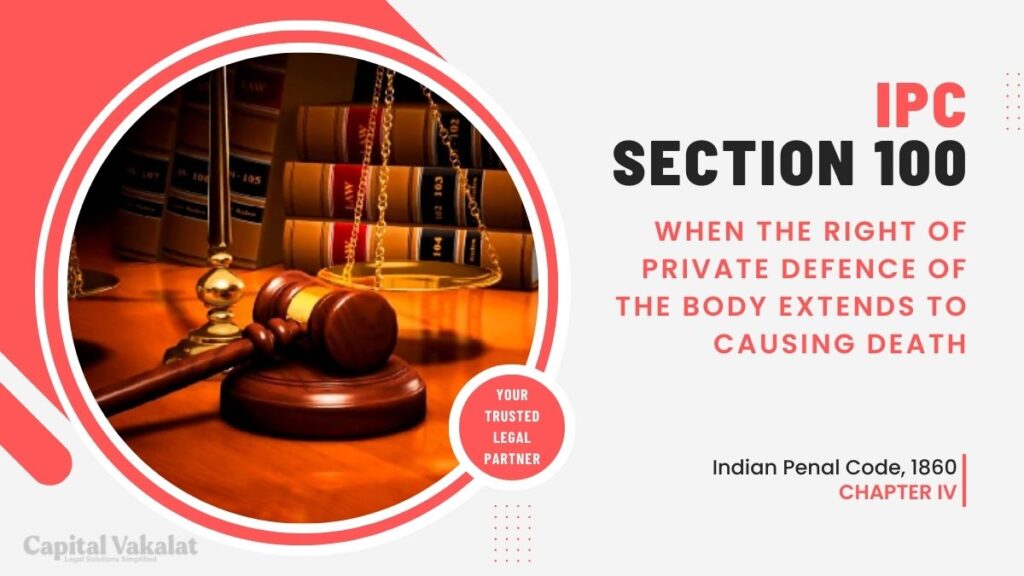In the realm of criminal law, the right to self-defense is a fundamental principle that allows individuals to protect themselves or others from imminent harm. Section 100 of the Indian Penal Code (IPC) addresses a critical aspect of this right, namely, when the right of private defense of the body extends to causing death.
This legal provision is of paramount importance as it defines the boundaries within which individuals can resort to lethal force to safeguard their lives or the lives of others.

In this comprehensive article, we will delve into the intricacies of Section 100 IPC, exploring its various aspects, implications, and the conditions that must be met for justifiable use of lethal force.
Understanding Section 100 IPC
Section 100 of the IPC provides individuals with the legal authority to use force, including deadly force, to protect their own lives or the lives of others under specific circumstances. It is essential to emphasize that this right is not absolute and must meet certain criteria to be considered justifiable.
Imminent Threat
One of the key conditions under Section 100 is the presence of an imminent threat. This means that the danger must be immediate and unavoidable. Individuals cannot resort to deadly force if the threat is not immediate.
Reasonable Apprehension
To invoke the right of private defense extending to causing death, there must be a reasonable apprehension of death or grievous bodily harm. This condition ensures that the use of lethal force is proportionate to the perceived threat.
No Safer Alternative
The law requires individuals to exhaust all reasonable alternatives before resorting to deadly force. If there is a safer option available, using lethal force may not be considered justifiable.
Proportionality
The principle of proportionality dictates that the force used should be proportional to the threat faced. Excessive force is not permissible under Section 100.
Scenarios Where Section 100 Applies
Assault with Deadly Weapons
When faced with an assailant armed with a deadly weapon, individuals may use lethal force to protect themselves or others.
Protecting Others
Section 100 also applies when one intervenes to protect another person who is under imminent threat of death or grievous bodily harm.
Attempted Murder
If someone is attempting to murder another, the victim can invoke Section 100 to defend themselves.
Controversies Surrounding Section 100 IPC
Interpretation
The interpretation of Section 100 has been a subject of debate. Courts often have to decide whether the use of lethal force was genuinely justifiable in a given situation.
Misuse
There have been instances of individuals misusing this provision to justify acts of violence. Striking the right balance between self-defense and misuse is a constant challenge.
Conclusion
In conclusion, Section 100 IPC plays a crucial role in defining the right of private defense when it extends to causing death. It is a legal provision that seeks to balance the need for self-preservation with the requirement for proportionality and reasonableness. Understanding the conditions and limitations of this provision is vital for individuals to exercise their right of self-defense responsibly and within the boundaries of the law.
FAQs
What happens if I use excessive force under Section 100?
Using excessive force can lead to legal consequences. It is crucial to ensure that the force used is proportional to the threat faced.
Are there any situations where lethal force is never justified under Section 100?
Lethal force is not justified if there is a safer alternative available or if the threat is not immediate and imminent.
How does one prove that they had a reasonable apprehension of death or grievous bodily harm?
This is a matter of evidence in court. Witnesses, the circumstances of the situation, and the actions of the aggressor can all play a role in establishing reasonable apprehension.
Can private security personnel use lethal force under Section 100?
Private security personnel may use lethal force in self-defense or to protect others, but they are subject to the same legal criteria as ordinary individuals. Their actions will be assessed based on the circumstances and the principles outlined in Section 100 IPC.